Stock Market Is Significantly Overvalued
The stock market is seriously overvalued and the Trump rally can’t last indefinitely. At least, that’s according to economist and Yale professor Robert Shiller. In fact, investors are so excited about the Trump presidency that they are overlooking the downside risk. The last time investors were this focused (had tunnel vision), was back in 2000. It didn’t end well. (Source: “Why Robert Shiller Is Worried About the Trump Rally,” Bloomberg, March 13, 2017.)
In the old days, profits used to matter. It helped investors determine a stock’s valuation: whether it is overvalued, undervalued, or fairly valued. Stock market valuation isn’t the be-all and end-all, but it is/was an important metric used to help investors separate the wheat from the chaff.
But all of that has gone out the window. Profits don’t seem to matter to investors anymore. If fundamentals don’t matter, what does? Technicals and sentiment.
In fact, according to one chief investment officer, “It is safe to say that an investor with a twelve-month horizon would be better served ignoring valuation altogether and instead focusing simply on market momentum.” (Source: “Don’t pay attention to valuation measures,” Financial Times, September 1, 2010.)
Those prescient words were uttered back in 2010, when the bull market was just getting warmed up. But fast-forward seven years, and you can see that nothing has changed. Stock market valuation is dead. Long live the Federal Reserve and Donald Trump.
Unfortunately, because of this thinking, the markets are seriously overpriced. And eventually share prices and fundamentals will need to run in step, or a little closer than they are now.
Time to Reduce Your Holdings
According to Robert Shiller, investors are fixated on Donald Trump’s presidency, or rather, how his economic policies will juice the U.S. economy and help it eventually meet his campaign pledge of four percent annual gross domestic product (GDP) growth.
For all of Trump’s pro-business growth plans, his foreign policy and unorthodox, contradictory, management style breeds uncertainty. And that is exactly what investors don’t like. But for now, investors are throwing caution, and their retirement funds, to the wind, hoping his charisma translates into sustained economic growth.
The last time this kind of blind exuberance took over the markets was in 2000. The Internet evolved from a mere curiosity to the new frontier of corporate America. Before the dot-com crash in 2000, internet stocks went public with no proven business strategy, no earnings, and management spent like crazy. Investors were afraid to lose out and sent newly-minted IPO valuations into the stratosphere.
Eventually though, investors realized that a tech company with a billion-dollar market cap with no earnings and revenue was worthless. In March 2000, for no apparent reason, the selling started. Then it snowballed. And it didn’t stop until the tech-heavy Nasdaq had lost 80% of its value. By October 2002, the S&P 500 had fallen 49%.
It only recently made up that lost ground. And that’s part of the problem.
Investors have cast valuation to the curb and are afraid to miss out on the long-in-the-tooth bull market that got a second (third, fourth) wind after Donald Trump won the presidential election in November.
It’s a new era! Gone are the Obama years of sub-three-percent annual GDP growth. Donald Trump’s plans to cut taxes, cut red tape, and spend a trillion dollars on infrastructure spending, are going to usher in an era of prosperity.
Investors may think we’re in a new era, and that it’s different this time, but the blinders are on to the downside risk in 2017 just like they were in 2000. Stocks are up 16% since the start of 2016 and have advanced 13.5% since just before Trump won the U.S. election.
It’s difficult for investors who have been on the sidelines to not follow the herd. But they need, according to Shiller, to resist the urge. Shiller is not taking any positions in U.S. stocks, but is instead buying overseas markets.
S&P 500 Overvalued By the Most Trusted Ratios
Investors are more focused on technicals and momentum and the market is overpriced. At least it is according to three of the most trusted valuations metrics. Including the CAPE Ratio, which helped Shiller earn the Nobel Prize in Economics in 2013.
The cyclically adjusted price-earnings (CAPE) ratio compares current prices to average earnings over the last 10 years. The ratio currently stands at 29.77; the long-term average is 16. This suggests the S&P 500 is overvalued by 86%. The CAPE ratio has only been this high for longer twice, in 1929 it was at 30 and in 1999 it was at 45. (Source: “Case Shiller P/E Ratio,” Yale University, last accessed March 14, 2017.)
| CAPE Ratio History | CAPE Ratio |
| Black Tuesday, October1929 | 30 |
| Black Monday, October 1987 | 17.68 |
| December 1999 | 44.20 |
| October 2007 | 27.32 |
| March 2017 | 29.77 |
While Shiller suggests it’s impossible to predict short-term moves, the sky high valuations “would suggest reducing your holdings of stocks, especially for long-term investor.” A CAPE reading at 30 does not mean a stock market crash is imminent, but “when it’s this high, over the long term, it usually doesn’t do great.” (Source: “Robert Shiller: With stock valuations high, it’s time to reduce your holdings,” CNBC, February 24, 2017.)
It isn’t just Shiller’s math that suggests the markets are overvalued. The market-cap-to-GDP ratio suggests the markets are significantly overvalued. The ratio, which Warren Buffett calls the single best measure of stock valuations, is at 130.2%. A reading of 100% suggests stocks are fairly valued. The ratio has only been higher once since 1950; in 1999 it was at 153.6%.
Meanwhile, the Wilshire 5000 to GDP ratio is at an all-time high of around 140.5. (Source: “Wilshire 5000 Total Market Full Cap Index©/Gross Domestic Product,” Federal Reserve Bank of St. Louis, last accessed March 14, 2017.)
Stocks Will Get Even More Overvalued
President Trump’s economic platform hasn’t even been introduced yet. So impatient investors don’t know if they’ll work or not. With nothing to impede the bullish sentiment, investors will send the already overvalued market even higher. It’s what investors did in 1929, 2000, and 2007-2008. Even those who don’t care about valuation know how that ended.






